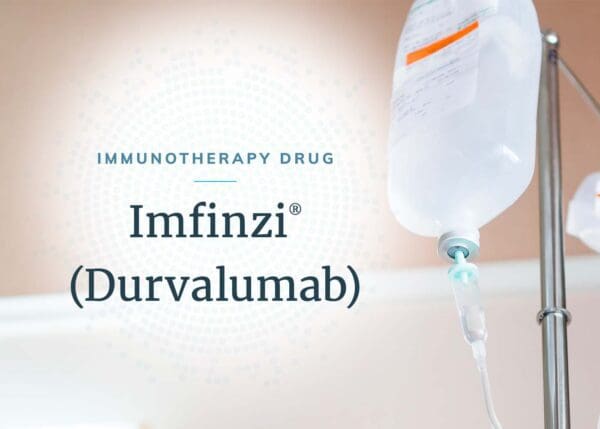01. What Is Imfinzi?
What Is Imfinzi (Durvalumab)?
Imfinzi® (durvalumab) is an immunotherapy drug. It belongs to a class of drugs known as checkpoint inhibitors. Checkpoint inhibitors block safeguards within the immune system. These safeguards are called immune checkpoints. When these checkpoints are blocked, immune cells (called T cells) can attack cells they might normally ignore, such as cancer cells. This allows the immune system to help fight cancer.
The U.S. Food and Drug Administration (FDA) has approved Imfinzi to treat certain cancers. The FDA approval covers:
- Adults who have non-small cell lung cancer (NSCLC): Imfinzi may be used in patients whose cancer has not progressed after a round of chemotherapy and radiation.
- Adults with extensive-stage small cell lung cancer (ES-SCLC): Imfinzi may be used in combination with the chemotherapy drugs etoposide and either carboplatin or cisplatin.
Currently, Imfinzi does not have FDA approval to treat mesothelioma. However, some mesothelioma patients may receive this drug through clinical trials.
Resources for Mesothelioma Patients
02. Imfinzi and Mesothelioma
How Does Imfinzi (Durvalumab) Treat Mesothelioma?
Imfinzi works by allowing the immune system to recognize and attack cancer cells. Healthy cells have proteins that can “shake hands” with a specific protein on an immune cell. This interaction is called an immune checkpoint. When the healthy cell and immune cell complete this handshake, the immune cell knows not to attack the healthy cell. But cancer cells can also use immune checkpoints to hide from immune cells. Imfinzi blocks the checkpoint. Once the checkpoint is blocked, immune cells can attack cancer cells.
Imfinzi is similar to two other immunotherapy drugs, Opdivo® (nivolumab) and Keytruda® (pembrolizumab). All three drugs target the PD-1/PD-L1 immune checkpoint. However, Opdivo and Keytruda both block immune cells from participating in the checkpoint.
Imfinzi takes a different approach. It blocks cancer cells from participating in the checkpoint. Blocking the checkpoint from either side allows immune cells to fight cancer.
Imfinzi has been tested in combination with the immunotherapy drug Imjudo® (tremelimumab). Researchers have also investigated Imfinzi in combination with chemotherapy drugs in a clinical trial.
Currently, Imfinzi does not have FDA approval to treat mesothelioma. Researchers continue to test its efficacy through mesothelioma clinical trials.
Imfinzi (Durvalumab) and Tremelimumab for Pleural Mesothelioma
Imfinzi does not have FDA approval to treat mesothelioma. As such, it does not have a drug it is commonly associated with to treat pleural mesothelioma. However, doctors have investigated Imfinzi in a phase II clinical trial. Trial patients underwent treatment with Imfinzi and tremelimumab.
Patients who received this combination during the clinical trial achieved a median survival of 16.6 months. Patients can speak with their provider to see if Imfinzi is an option for them. A mesothelioma doctor can help patients understand the drug’s potential benefits and risks.
Imfinzi (Durvalumab) for Asbestos-Related Lung Cancer
Imfinzi is FDA-approved to treat qualified patients for certain lung cancers. Doctors can recommend Imfinzi for:
- Extensive-stage small cell lung cancer: Imfinzi has approval for first-line treatment of ES-SCLC. It is approved for use with etoposide and either carboplatin or cisplatin.
- Non-small cell lung cancer: Imfinzi has FDA approval for the treatment of adults with unresectable (inoperable) stage 3 NSCLC. Doctors may recommend Imfinzi for patients whose cancer has not progressed after chemotherapy and radiation therapy.
Asbestos exposure can cause lung cancer and other types of cancer. A doctor may determine that treatment with Imfinzi is an option for some patients. Patients can discuss any treatment options with their doctor.
03. What to Expect
What to Expect During Treatment
There is no standard Imfinzi treatment for mesothelioma. However, patients may expect an experience similar to the procedures used in clinical trials. A recent phase II trial tested Imfinzi and tremelimumab on mesothelioma patients. During the trial, patients went through two separate phases.
The first phase was called the induction phase. It involved treatment with Imfinzi and tremelimumab. Patients received 1 milligram of tremelimumab per kilogram of body weight. They also received 20 milligrams of Imfinzi per kilogram of body weight. Doses of each drug were given intravenously every month for four months.
The second phase was a maintenance phase. This phase included a single dose of 20 milligrams of Imfinzi per kilogram of weight. Patients received one intravenous dose each month until a doctor determined treatment should stop.
Researchers said infusions took roughly one hour to complete. Treatment stopped if:
- The doctors chose to suspend it
- The patient chose to withdraw
- The patient experienced disease progression
- The patient had unacceptable side effects
During treatment, doctors monitored study patients with routine laboratory tests. These tests help monitor a patient’s response to treatment.
Preparing for Your Appointment
Before beginning immunotherapy, patients may want to talk to their doctors about preparing their bodies and immune systems for treatment. Each cancer center may have different guidelines for what patients should do before they begin treatment. However, general guidelines include:
- Eat well: Following a healthy diet may give the patient the energy they need for treatment. The healthcare team may also recommend avoiding alcohol.
- Exercise: The healthcare team may encourage patients to stay active before and during treatment.
- Quit smoking: Patients may want to talk with their healthcare team about smoking cessation programs. Quitting smoking may help the patient.
- Sleep well: A good night’s sleep may help decrease any strains on the immune system.
On the day of the first infusion, patients may want to arrange for transportation until they know how they will react to the treatments. Patients can discuss concerns about their specific treatment with their healthcare team.
04. Benefits of Imfinzi
Imfinzi (Durvalumab) Benefits
Clinical trials of Imfinzi have revealed some survival and incidental benefits. During one clinical trial, Imfinzi was paired with tremelimumab. Researchers found that this combination of checkpoint inhibitors may benefit patients. The study found the following survival data:
- Patients who received initial treatment: Median overall survival of 16.6 months
- Patients who received a second course of immunotherapy: Median survival of 26 months
The study tested pleural and peritoneal mesothelioma patients. It also included patients with different cell types, including epithelioid mesothelioma and biphasic mesothelioma.
Checkpoint inhibitor treatments may have other benefits compared to radiation and chemotherapy. Other reported Imfinzi benefits include:
- Lower rates of severe side effects compared to other checkpoint inhibitors
- Minimal pre-treatment preparation
- No need for a surgically implanted port
Patients interested in receiving Imfinzi for mesothelioma can speak with their doctors. The doctor can provide relevant information to each individual’s case.
05. Side Effects of Imfinzi
Imfinzi (Durvalumab) Side Effects
All cancer treatments have the potential to cause side effects. Imfinzi and other checkpoint inhibitors may cause reactions because of their effects on the immune system. Side effects will also vary from person to person and depend on multiple factors.
Imfinzi allows T cells to attack other cells they would normally ignore. As a result, the T cells can attack cancer cells. However, the T cells may also attack healthy cells.
If this happens, it may produce symptoms similar to those of an autoimmune condition. Such side effects are called immune-related adverse events. Doctors may pause or stop the treatment if severe immune-related adverse events appear.
One study showed that 85% of patients reported some type of side effect with Imfinzi and tremelimumab. Of those, only 8% had immune-related side effects severe enough to stop treatment. Overall, researchers found that most side effects were manageable.
Some common side effects with immunotherapy include:
- Flu-like symptoms
- Itchy skin
- Pain or soreness in joints and muscles
- Rashes or redness
- Swelling
Patients can work with their healthcare team to monitor for side effects. If side effects occur, doctors can help patients manage them.
Managing Side Effects
Patients may have side effects when receiving treatment using Imfinzi. Patients can speak with their cancer care team to let them know of any new symptoms as soon as they appear.
Side effects can vary across patients and in severity. Patients can have mild to severe side effects, which can show up at any time during treatment. The care team will watch the patient throughout treatment.
If side effects appear, the care team may choose to pause treatment to give the patient’s body time to heal. Severe side effects may mean patients need to stop treatment completely. A doctor can help patients manage side effects, but the doctor and patient generally work together to identify them.
06. Imfinzi Eligibility
Who Is Eligible for Imfinzi (Durvalumab)?
Imfinzi does not have FDA approval to treat mesothelioma. Thus, eligibility criteria for mesothelioma patients have not yet been determined. To be eligible, patients may need to qualify for a clinical trial that includes Imfinzi treatment.
Adult patients may be eligible for Imfinzi treatment of some lung cancers. This includes stage 3 non-small cell lung cancer that is not eligible for surgery. To be eligible for Imfinzi, these patients should have completed a round of platinum-based chemotherapy or radiation therapy. Imfinzi may be used following these treatments if the cancer has not progressed.
Some adult patients may be eligible if they have ES-SCLC. The approved treatment includes a combination of Imfinzi, etoposide and either carboplatin or cisplatin.
07. Imfinzi Studies
Clinical Trials and Studies on Imfinzi (Durvalumab) for Mesothelioma
Researchers completed a phase II trial of Imfinzi and tremelimumab in 2018. This study started with 40 participants in 2015. It included patients with pleural or peritoneal mesothelioma that could not be surgically treated.
After an initial round of the immunotherapy duo, eligible patients could receive a second treatment. The trial tested chemotherapy and immunotherapy in the second round. Results included:
- Second round treatment with chemotherapy: Median survival of about 11 months
- Second round treatment with immunotherapy: Median survival of about 26 months
A phase III clinical trial is underway. This trial will compare two different treatments. The first is a platinum-based chemotherapy drug and pemetrexed. The second option adds Imfinzi to the same regimen. The trial is expected to finish in 2025.
Patients interested in taking part in a clinical trial can discuss it with their doctors.










